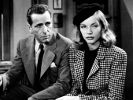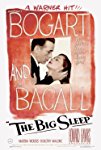Eye For Film >> Movies >> The Big Sleep (1946) Film Review
The Big Sleep
Reviewed by: Jennie Kermode

The Big Sleep has the distinction of being without doubt one of the greatest crime films of the Forties, yet also one of the least structurally satisfying. Showcasing Bogart and Bacall at the height of their talents, it sizzles with energy, and a witty script holds the viewer's attention throughout - it's just that, by the end, you may be left quite unsure what has actually happened, or why you should care. Fortunately, this does nothing to diminish the thrill.
Crime novels, whilst packed with cinematic appeal, often present problems due to convoluted plotting. That's just fine on the page but the big screen requires shorter, tighter stories, and this Raymond Chandler bestseller doesn't translate well. It's further complicated by the restrictive Hays Code in operation at the time, which forced the screenwriters to modify central plot elements. They were also supposed to tune down its sexuality, but there are still a few passages of highly suggestive dialogue and it's not clear that it would have been possible to put the two stars on screen together without sparks flying. Martha Vickers also exhibits a charged screen presence which at times threatens to overwhelm Bacall, and the rumour is that her part was substantially cut back because of it.

The result is an uneven film whose visual and emotional impact is far greater than the intellectual satisfaction it purports to offer. At its centre, however, is an intellectual puzzle. Rather than tell another straightforward story of murder, blackmail, and their unravelling, Chandler was interested in exploring the process of investigation itself. This gives us significantly more insight into the character of Philip Marlowe than we get in its sister films and it will provide contemporary crime fans with an intriguing insight into the processes and standards of the day. The main problem is a glut of underdeveloped minor characters, but Bogart is a sufficiently commanding lead to keep us focused on his actions. He also manages a very precise balance between world-weary brilliance and human vulnerability, whether the threat is a man with a gun or a dame in a silk negligee. We never quite feel that he's safe, or that he is as incorruptible as we might hope, and as other characters' motives shift in and out of focus, constantly changing our perspective, we are easily drawn into the central mystery.
An atmospheric soundtrack, including a classic song by Bacall, adds to the film noir mood which suffuses this film even in this recut cinematic version (which edited out some of the darkest elements). It is very much a character piece, and has more personality than any dozen modern mystery movies.
Reviewed on: 30 Dec 2010


















